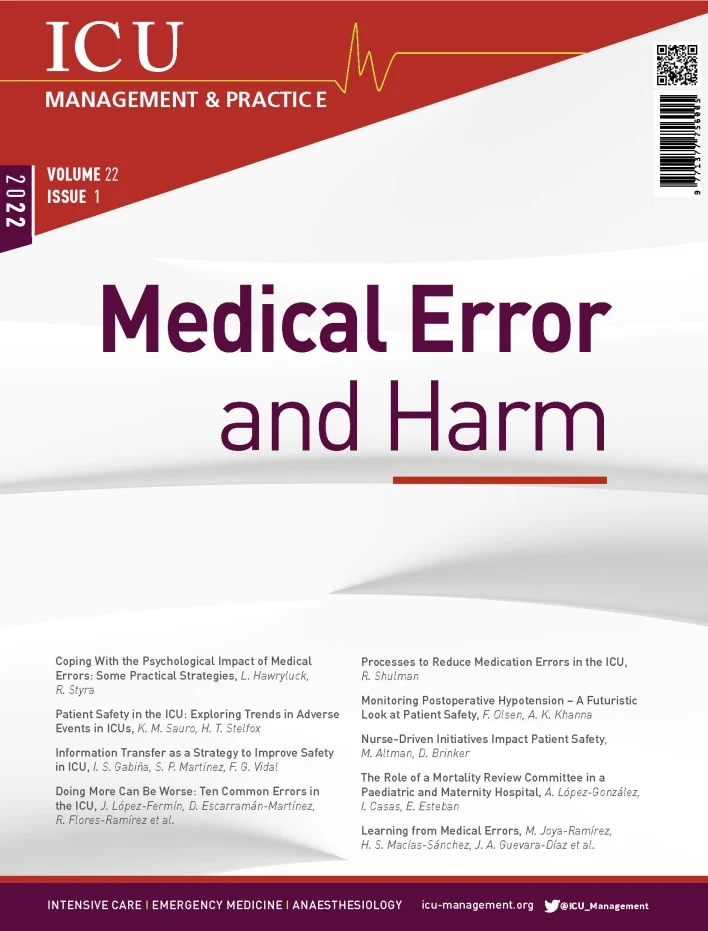
ICU Management & Practice, Volume 22 - Issue 1, 2022
Download PDF |
 |
| PRINT OPTIMISED |
Download PDF |
 |
| SCREEN OPTIMISED |
Editorial
Medical Error And Harm
Patients in the intensive care unit generally have complex healthcare issues with underlying comorbidities and organ dysfunction. They are thus more vulnerable to medical errors. Often, the treatment of these patients requires the use of interventions that could potentially result in adverse events, errors and harm. While critical care guidelines provide the necessary recommendations to ensure these errors...
Point-of-View
Diagnostic and Prognostic Value of Estimated Plasma Volume Status
An overview of estimated plasma volume (ePVS), recent evidence supporting the association of ePVS with clinical congestion and whether it can help improve outcomes in patients with heart failure (HF). Plasma volume (PV) is the level of intravascular fluid minus the red blood cells, white blood cells and platelets. PV in heart failure (HF) patients is associated with increases in fluid compartments. For ex...
Medical Error And Harm
Coping With the Psychological Impact of Medical Errors: Some Practical Strategies
Significant efforts have been made to make hospitals and ICUs as safe as possible. As healthcare workers (HCWs) try to get through this pandemic, the focus of this article is to explore practical steps to help these workers better cope with the psychological effects of being involved in an error event. With all the efforts being made to make hospitals and ICUs as safe as possible, many layers of protecti...
Patient Safety in the ICU: Exploring Trends in Adverse Events in ICUs
Adverse events (AEs) are common among critically ill patients. Evidence about the nature, preventability and predictability of AEs can be used to reinvest in efforts to reduce them and improve patient safety in ICUs. Mr. A, a previously well 70-year-old male was admitted to the intensive care unit (ICU) with respiratory failure secondary to novel SARS-CoV-2 (COVID-19). He received two weeks of aggressive...
Information Transfer as a Strategy to Improve Safety in ICU
The transmission of information (TOI) in extremely variable environments, such as the ICU, is crucial. The content and how it is transmitted can be decisive in the safe care of the critical patient. In an Intensive Care Unit (ICU), we attend people with a wide range of pathologies. All the information obtained from monitoring our critical patients, diagnostic and therapeutic techniques, responses to treat...
Doing More Can Be Worse: Ten Common Errors in the ICU
Some of the most common interventions in the ICU can be associated with poor results. We present ten situations in which doing less is better for the critically ill patient. For decades, the focus of patient management in the Intensive Care Unit (ICU) has been to perform a large number of interventions in critically ill patients, many of which are based on clinical judgment and the pathophysiology of dise...
Processes to Reduce Medication Errors in the ICU
Medication errors are common in the complex environment of the ICU. This article provides an overview of the prevalence and impact of these errors and the processes that could help reduce their incidence. Medicines are the most widely used intervention in the critical care environment, and errors in medication use are a well-established complication. Medication errors have been broadly defined as any erro...
Monitoring Postoperative Hypotension – A Futuristic Look at Patient Safety
Post-operative hypotension is a frequent occurrence that is unrecognised with intermittent spot checks based monitoring in most hospital ward patients. Myocardial injury is strongly associated with hypotension in this period of recovery from surgery. Upgrading ward monitoring to portable, smart, and continuous systems with effective alarm management and efficient response systems is the need of the hour. It...
Nurse-Driven Initiatives Impact Patient Safety
This article highlights the effects of the COVID-19 pandemic on patient quality and safety and discusses an academy designed to support nurses to design and implement innovative solutions. The COVID-19 pandemic has heightened the crisis of patient safety with an increase in hospital-acquired conditions (HACs) after more than five years of declining incidence (Weinter-Lastinger et al. 2022). Hospital pati...
The Role of a Mortality Review Committee in a Paediatric and Maternity Hospital
There is little information in the current literature on the organisation of mortality review committees in paediatric and maternity hospitals. This article aims to explain the objectives and function of the mortality review committee of our hospital, an articulated tool to improve the quality of patient care based on reviews of deaths in our centre. Paediatric and maternity hospitals report far fewer dea...
Learning from Medical Errors
Healthcare professionals/trainees are often unprepared to experience and learn from errors due to structural characteristics of our systems and training programmes. Restructuration is needed to allow learning from errors. Medical error is considered one of the ten leading causes of death and disability in the world and as many as 4 in 10 patients are harmed globally (World Health Organization 2019). Mista...
DigiConf
Medical Error, Harm and Patient Safety
Join our panellists on March 1 at 16:00 CET as they discuss the prevalence and types of medical errors in the ICU, the psychological impact of these errors, and strategies to prevent them and improve the safety of critically ill patients. Moderator Jean-Louis Vincent Editor-in-Chief ICU Management & Practice Professor Department of Intensive Care Erasme Hospital Université libre de Bruxelles Brusse...
Agenda
Upcoming events/courses/congresses
MARCH 1 ICU Management & Practice DigiConf Medical Error, Harm and Patient Safety Virtual Event https://iii.hm/1eh6 22-25 41st ISICEM Brussels, Belgium https://iii.hm/1eei 24-25 8th International Conference on Surgery & Anesthesia London, UK https://iii.hm/1eej APRIL 18-21 51st Critical Care Congress SCCM 2022 Virtual event https://iii.hm/1egu 23-26 32nd ECCMID Lisbon, Portugal https://iii.hm...
















